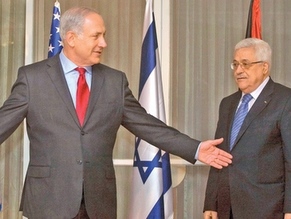|
World Jewish News

Benjamin Netanyahu greeting Mahmoud Abbas at his residence in Jerusalem, Sept. 14, 2010. Photo by: AP
|
Netanyahu: Palestinian Authority must choose - peace with Israel or Hamas
28.04.2011, Israel Prime Minister Benjamin Netanyahu said Wednesday that the Palestinian Authority must choose whether it is interested in peace with Israel or reconciliation with Hamas.
In a statement released shortly after Palestinian President Mahmoud Abbas' Fatah movement signed an initial reconciliation deal with the rival movement, reiterated his recent remarks that peace with both Israel and Hamas was impossible.
"The Palestinian Authority must choose either peace with Israel or peace with Hamas. There is no possibility for peace with both. Hamas aspires to destroy Israel and fires rockets at our cities ... at our children," Netanyahu said in a statement.
"The idea of reconciliation with Hamas demonstrates the weakness of the Palestinian Authority and makes one wonder whether Hamas will seize control of Judea and Samaria the way it seized control of the Gaza Strip," added the premier, referring to the West Bank,
"I hope the Palestinian Authority will make the right choice and choose peace with Israel," said Netanyahu. "The choice is in the hands of the Palestinian Authority.
Hamas said a few hours later that Israel has never been interested in Palestinian reconciliation.
"Israel is not concerned with Palestinian reconciliation and has been an impediment to it in the past," Hamas spokesman Taher al-Noono told journalists in Cairo.
Palestinian Authority spokesman Nabil Abu Rdeneh replied that reconciliation is an internal Palestinian issue and not Israel's concern.
"Netanyahu must choose between a just peace with the united Palestinian people ... and settlements," Abu Rdaineh said.
The deal between Fatah and Hamas, which took many officials by surprise, was thrashed out in Egypt and followed a series of secret meetings. The two groups shared a unity government until June 2007, when Hamas staged a bloody coup and took over the Gaza Strip.
Restoring Palestinian unity is seen as crucial to reviving any prospect for a Palestinian state based on peaceful co-existence alongside Israel. Fatah, the mainstream Palestinian movement until a 2006 election victory by Hamas, backs negotiated peace but the Islamists reject it.
With peace talks stalled since September, Abbas has begun an effort to win international recognition of Palestine, with or without an agreement with Israel. That effort is to culminate at the United Nations in September.
Netanyahu is expected to address a joint meeting of the U.S. Congress during a visit to Washington next month where he plans to outline his plan to re-start frozen peace talks with Abbas' Palestinian Authority that controls the West Bank.
In addition to Netanyahu, a wave of varied responses could be heard across Israel to news of the reconciliation deal.
A spokesman for Netanyahu's own Likud party. "While Israel holds out a hand in peace, the Palestinian Authority holds out a hand of terror. The embrace with Hamas proves that the Palestinians are not aiming for peace."
The chairman of the Yesha Council of Settlements, Danny Dayan, said the Palestinian Authority had clearly chosen reconciliation over peace with Israel.
"The decision of the Palestinians is absolutely clear – Hamas is preferable to Israel, and unilateral steps are preferable to negotiation," said Dayan. "In light of this, a Bar Ilan 2 speech should only include one statement: the first Bar Ilan speech is canceled – the Palestinian state will not be established."
Noam Shalit, whose son Gilad has been in Hamas captivity since he was abducted in a cross-border raid while stationed near the Gaza Strip in 2006, told Haaretz he hoped that the reconciliation would speed up a prisoner swap deal.
"I don't know what will develop, because only two days ago Hamas threatened to hurt Gilad," said Shalit. "Therefore, it's impossible to say it's over until it's over, and we know there are still many obstacles along the way."
The leftist Meretz party expressed "satisfaction and cautious hope" that the deal would bring forth a moderate political platform that would "assist advancing the political process and ending Gilad Shalit's tragedy with his release".
The United States reacted coolly to a reconciliation between the two main Palestinian factions, calling Hamas a "terrorist" group and saying any Palestinian government must renounce violence.
"We have seen the press reports and are seeking more information. As we have said before, the United States supports Palestinian reconciliation on terms which promote the cause of peace," the State Department said.
"To play a constructive role, any Palestinian government must accept the Quartet principles by renouncing violence, accepting past agreements, and recognizing Israel’s right to exist," it added.
By Barak Ravid
Haaretz.com
|
|
